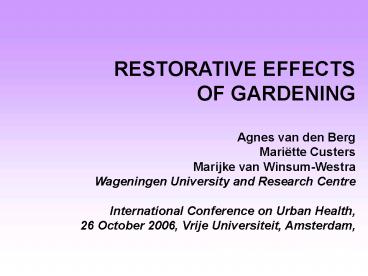RESTORATIVE EFFECTS OF GARDENING - PowerPoint PPT Presentation
1 / 19
Title:
RESTORATIVE EFFECTS OF GARDENING
Description:
RESTORATIVE EFFECTS OF GARDENING. Agnes van den Berg. Mari tte Custers. Marijke van Winsum-Westra ... Parks consisting of parcels of land assigned to individual ... – PowerPoint PPT presentation
Number of Views:74
Avg rating:3.0/5.0
Title: RESTORATIVE EFFECTS OF GARDENING
1
RESTORATIVE EFFECTS OF GARDENING Agnes van den
Berg Mariëtte Custers Marijke van
Winsum-Westra Wageningen University and Research
Centre International Conference on Urban Health,
26 October 2006, Vrije Universiteit, Amsterdam,
ICUH, October 26, 2006
2
BACKGROUND
VITAMIN G Health benefits of nature
G1 Netherlands
G2 Neighborhoods
G3 Allotment gardens
Restorative (relaxing) effects of gardening
1. Experiment
1. Experiment
2. Survey
3. Diary study
3
ALLOTMENT GARDEN
Parks consisting of parcels of land assigned to
individual families.
4
PEOPLE THINK GARDENING PROMOTES RELAXATION
Dunnett Quasim, 2000 What do you enjoy about
your garden and gardening?
Promoting relaxation (74)
5
PEOPLE ACT ON THOSE BELIEFS
6
DOES IT REALLY WORK?
- As yet, no controlled research
- But good reasons to assume that gardening indeed
promotes restoration from stress
Exercise
-
gardening
stress
Contact with nature
-
7
RESTORATIVE EFFECTS OF EXERCISE
Exercise provides outlet for flight-fight impulse
8
RESTORATIVE EFFECTS OF NATURE
- Attention Restoration Theory (Kaplan Kaplan,
1989) - Contact with nature has survival-promoting
qualities - Soft fascination nature automatically draws
attention without taking up all resources - Mechanism for directed attention can rest
- Restoration from mental fatigue and stress.
9
THE EXPERIMENT
30 members of the allotment complex
Amstelglorie in Amsterdam were randomly
assigned to conditions of gardening or a passive
reading task. Stress was induced by performing a
stressful computertask. Affective, cognitive and
physiological functioning was measured before and
after the stressful task, and during and after
the relaxing task.
1 person removed because of interruptions
10
STRESS INDUCTION STROOP TASK
- Color naming task
- on laptop
- 25 minutes
- (false) negative feedback
11
STRESS MEASURES
2. PANAS (self-reported mood)
12
CONDITIONS
- GARDENING 30 minutes of light activities in own
garden - READING 30 minutes reading magazines screened
for absence of pictures of nature, with back to
window or curtains closed.
13
DESIGN
10.30 AM 13.00 PM 15.30 PM
14
RESULTS CORTISOL
Interaction Time (T1,T2,T3) x Condition (Reading,
gardening) with Cortisol T0 and Time of Day as
covariates F (1.94, 46.5) 4.20, p lt .05
15
RESULTS POSITIVE AFFECT
Interaction Time (T1,T3) x Condition (Reading,
gardening) with Affect T0 and Time of Day as
covariates F (1, 24) 2.05, p .078
16
RESULTS NEGATIVE AFFECT
No significant effects.
17
RESULTS NECKER CUBE
No significant effects.
18
ROLE OF PREFERENCE?
- Is gardening also restorative for people who do
not like gardening? - Clue reading is restorative for those who prefer
passive activity.
19
LESSONS LEARNED
Gardening promotes faster and more complete
restoration from physiological stress than a
passive reading task
- Stroop task is effective stress-inducer
- Cortisol is a new, promising physiological
measure in restorative environments research - Several possible underlying mechanism (nature,
exercise, fresh air) - No (significant) effects on mood/concentration
different measures needed? - Role of preference deserves further attention.































